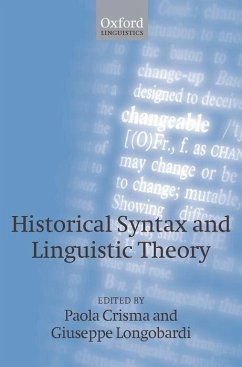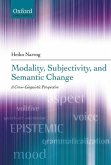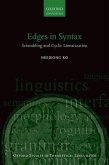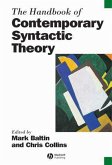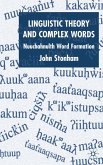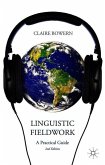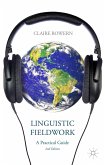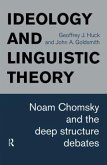Historical Syntax and Linguistic Theory
Herausgeber: Crisma, Paola; Longobardi, Giuseppe
Historical Syntax and Linguistic Theory
Herausgeber: Crisma, Paola; Longobardi, Giuseppe
- Gebundenes Buch
- Merkliste
- Auf die Merkliste
- Bewerten Bewerten
- Teilen
- Produkt teilen
- Produkterinnerung
- Produkterinnerung
This book of new work by leading international scholars considers developments in the study of historical linguistics and grammatical theory. It then tests their value and applicability by examining diachronic transmission of syntax at different times and in a wide range of languages.
Andere Kunden interessierten sich auch für
![Modality, Subjectivity, and Semantic Change Modality, Subjectivity, and Semantic Change]() Heiko NarrogModality, Subjectivity, and Semantic Change166,99 €
Heiko NarrogModality, Subjectivity, and Semantic Change166,99 €![Edges in Syntax Edges in Syntax]() Heejeong KoEdges in Syntax157,99 €
Heejeong KoEdges in Syntax157,99 €![The Handbook of Contemporary Syntactic Theory The Handbook of Contemporary Syntactic Theory]() Mark Baltin / Chris Collins (eds.)The Handbook of Contemporary Syntactic Theory98,99 €
Mark Baltin / Chris Collins (eds.)The Handbook of Contemporary Syntactic Theory98,99 €![Linguistic Theory and Complex Words Linguistic Theory and Complex Words]() J. StonhamLinguistic Theory and Complex Words57,99 €
J. StonhamLinguistic Theory and Complex Words57,99 €![Linguistic Fieldwork Linguistic Fieldwork]() C. BowernLinguistic Fieldwork38,99 €
C. BowernLinguistic Fieldwork38,99 €![Linguistic Fieldwork Linguistic Fieldwork]() C. BowernLinguistic Fieldwork38,99 €
C. BowernLinguistic Fieldwork38,99 €![Ideology and Linguistic Theory Ideology and Linguistic Theory]() John A GoldsmithIdeology and Linguistic Theory184,99 €
John A GoldsmithIdeology and Linguistic Theory184,99 €-
-
-
This book of new work by leading international scholars considers developments in the study of historical linguistics and grammatical theory. It then tests their value and applicability by examining diachronic transmission of syntax at different times and in a wide range of languages.
Produktdetails
- Produktdetails
- Verlag: Oxford University Press (UK)
- Seitenzahl: 432
- Erscheinungstermin: 15. Mai 2009
- Englisch
- Abmessung: 234mm x 157mm x 33mm
- Gewicht: 816g
- ISBN-13: 9780199560547
- ISBN-10: 0199560544
- Artikelnr.: 26865487
- Herstellerkennzeichnung
- Libri GmbH
- Europaallee 1
- 36244 Bad Hersfeld
- gpsr@libri.de
- Verlag: Oxford University Press (UK)
- Seitenzahl: 432
- Erscheinungstermin: 15. Mai 2009
- Englisch
- Abmessung: 234mm x 157mm x 33mm
- Gewicht: 816g
- ISBN-13: 9780199560547
- ISBN-10: 0199560544
- Artikelnr.: 26865487
- Herstellerkennzeichnung
- Libri GmbH
- Europaallee 1
- 36244 Bad Hersfeld
- gpsr@libri.de
Paola Crisma studied in Venice, Geneva and Los Angeles and is currently Assistant Professor in English Linguistics at the University of Trieste, after teaching at Padua and being a Fulbright visiting scholar at MIT and UCLA. She has published on comparative syntax, syntax acquisition, and history of English. Giuseppe Longobardi graduated from Pisa and is now Professor of General Linguistics at the University of Trieste, after teaching at Pisa and Venice. He held visiting positions at Vienna, UCLA, USC, Harvard, the CNRS in Paris, and published extensively on syntactic theory and historical syntax.
* 1: Paola Crisma and Giuseppe Longobardi: Change, Relatedness, and
Inertia in Historical Syntax
* Part I: Theoretical Issues in Historical Syntax
* 2: Edward L. Keenan: Linguistic Theory and the Historical Creation of
English Reflexives
* 3: Chris H. Reintges: Spontaneous Syntactic Change
* 4: Theresa Biberauer and Ian Roberts: The Return of the Subset
Principle
* 5: Marit R. Westergaard: Many Small Catastrophes: Gradualism in a
Microparametric Perspective
* Part II: External and Internal Sources of Morphosyntaactic Change
* 6: Elly van Gelderen: Feature Economy in the Linguistic Cycle
* 7: Agnes Jäger: Sources of Change in the German Syntax of Negation
* 8: Katrin Axel: The Consolidation of Verb-Second in Old High German:
What Role did Subject Pronouns Play?
* 9: Ana Maria Martins and Jairo Nunes: Syntactic Change as Chain
Reaction: The Emergence of Hyper-Raising in Brazilian Portuguese
* 10: Juanito Avelar: On the Emergence of ter as an Existential Verb in
Brazilian Portuguese
* 11: Jaume Mateu: Gradience and Auxiliary Selection in Old Catalan and
Old Spanish
* 12: Redouane Djamouri and Waltraud Paul: Verb-to-Preposition
Reanalysis in Chinese
* 13: Heidi Quinn: Downward Reanalysis and the Rise of Stative HAVE Got
* Part III: Parameter Resetting and Reanalysis
* 14: Edith Aldridge: The Old Chinese Determiner zhe
* 15: Griet Coupé and Ans van Kemenade: Grammaticalization of Modals in
Dutch: Uncontingent Change
* 16: Alice Davison: Correlative Clause Features in Sanskrit and
Hindi/Urdu
* 17: Denis Delfitto and Paola Paradisi: For a Diachronic Theory of
Genitive Assignment in Romance
* 18: Kleanthes K. Grohmann and RIchard Ingham: Expletive pro and
Misagreement in Late Middle English
* 19: VIctor Manfredi: Morphosyntactic Parameters and the Internal
Classification of Denue-Kwa (Niger-Congo)
* 20: Éric Mathieu: On the Germanic Properties of Old French
* 21: Akira Watanabe: A Parametric Shift in the D-system in Early
Middle English: Relativization, Articles, Adjectival Inflection, and
Indeterminates
Inertia in Historical Syntax
* Part I: Theoretical Issues in Historical Syntax
* 2: Edward L. Keenan: Linguistic Theory and the Historical Creation of
English Reflexives
* 3: Chris H. Reintges: Spontaneous Syntactic Change
* 4: Theresa Biberauer and Ian Roberts: The Return of the Subset
Principle
* 5: Marit R. Westergaard: Many Small Catastrophes: Gradualism in a
Microparametric Perspective
* Part II: External and Internal Sources of Morphosyntaactic Change
* 6: Elly van Gelderen: Feature Economy in the Linguistic Cycle
* 7: Agnes Jäger: Sources of Change in the German Syntax of Negation
* 8: Katrin Axel: The Consolidation of Verb-Second in Old High German:
What Role did Subject Pronouns Play?
* 9: Ana Maria Martins and Jairo Nunes: Syntactic Change as Chain
Reaction: The Emergence of Hyper-Raising in Brazilian Portuguese
* 10: Juanito Avelar: On the Emergence of ter as an Existential Verb in
Brazilian Portuguese
* 11: Jaume Mateu: Gradience and Auxiliary Selection in Old Catalan and
Old Spanish
* 12: Redouane Djamouri and Waltraud Paul: Verb-to-Preposition
Reanalysis in Chinese
* 13: Heidi Quinn: Downward Reanalysis and the Rise of Stative HAVE Got
* Part III: Parameter Resetting and Reanalysis
* 14: Edith Aldridge: The Old Chinese Determiner zhe
* 15: Griet Coupé and Ans van Kemenade: Grammaticalization of Modals in
Dutch: Uncontingent Change
* 16: Alice Davison: Correlative Clause Features in Sanskrit and
Hindi/Urdu
* 17: Denis Delfitto and Paola Paradisi: For a Diachronic Theory of
Genitive Assignment in Romance
* 18: Kleanthes K. Grohmann and RIchard Ingham: Expletive pro and
Misagreement in Late Middle English
* 19: VIctor Manfredi: Morphosyntactic Parameters and the Internal
Classification of Denue-Kwa (Niger-Congo)
* 20: Éric Mathieu: On the Germanic Properties of Old French
* 21: Akira Watanabe: A Parametric Shift in the D-system in Early
Middle English: Relativization, Articles, Adjectival Inflection, and
Indeterminates
* 1: Paola Crisma and Giuseppe Longobardi: Change, Relatedness, and
Inertia in Historical Syntax
* Part I: Theoretical Issues in Historical Syntax
* 2: Edward L. Keenan: Linguistic Theory and the Historical Creation of
English Reflexives
* 3: Chris H. Reintges: Spontaneous Syntactic Change
* 4: Theresa Biberauer and Ian Roberts: The Return of the Subset
Principle
* 5: Marit R. Westergaard: Many Small Catastrophes: Gradualism in a
Microparametric Perspective
* Part II: External and Internal Sources of Morphosyntaactic Change
* 6: Elly van Gelderen: Feature Economy in the Linguistic Cycle
* 7: Agnes Jäger: Sources of Change in the German Syntax of Negation
* 8: Katrin Axel: The Consolidation of Verb-Second in Old High German:
What Role did Subject Pronouns Play?
* 9: Ana Maria Martins and Jairo Nunes: Syntactic Change as Chain
Reaction: The Emergence of Hyper-Raising in Brazilian Portuguese
* 10: Juanito Avelar: On the Emergence of ter as an Existential Verb in
Brazilian Portuguese
* 11: Jaume Mateu: Gradience and Auxiliary Selection in Old Catalan and
Old Spanish
* 12: Redouane Djamouri and Waltraud Paul: Verb-to-Preposition
Reanalysis in Chinese
* 13: Heidi Quinn: Downward Reanalysis and the Rise of Stative HAVE Got
* Part III: Parameter Resetting and Reanalysis
* 14: Edith Aldridge: The Old Chinese Determiner zhe
* 15: Griet Coupé and Ans van Kemenade: Grammaticalization of Modals in
Dutch: Uncontingent Change
* 16: Alice Davison: Correlative Clause Features in Sanskrit and
Hindi/Urdu
* 17: Denis Delfitto and Paola Paradisi: For a Diachronic Theory of
Genitive Assignment in Romance
* 18: Kleanthes K. Grohmann and RIchard Ingham: Expletive pro and
Misagreement in Late Middle English
* 19: VIctor Manfredi: Morphosyntactic Parameters and the Internal
Classification of Denue-Kwa (Niger-Congo)
* 20: Éric Mathieu: On the Germanic Properties of Old French
* 21: Akira Watanabe: A Parametric Shift in the D-system in Early
Middle English: Relativization, Articles, Adjectival Inflection, and
Indeterminates
Inertia in Historical Syntax
* Part I: Theoretical Issues in Historical Syntax
* 2: Edward L. Keenan: Linguistic Theory and the Historical Creation of
English Reflexives
* 3: Chris H. Reintges: Spontaneous Syntactic Change
* 4: Theresa Biberauer and Ian Roberts: The Return of the Subset
Principle
* 5: Marit R. Westergaard: Many Small Catastrophes: Gradualism in a
Microparametric Perspective
* Part II: External and Internal Sources of Morphosyntaactic Change
* 6: Elly van Gelderen: Feature Economy in the Linguistic Cycle
* 7: Agnes Jäger: Sources of Change in the German Syntax of Negation
* 8: Katrin Axel: The Consolidation of Verb-Second in Old High German:
What Role did Subject Pronouns Play?
* 9: Ana Maria Martins and Jairo Nunes: Syntactic Change as Chain
Reaction: The Emergence of Hyper-Raising in Brazilian Portuguese
* 10: Juanito Avelar: On the Emergence of ter as an Existential Verb in
Brazilian Portuguese
* 11: Jaume Mateu: Gradience and Auxiliary Selection in Old Catalan and
Old Spanish
* 12: Redouane Djamouri and Waltraud Paul: Verb-to-Preposition
Reanalysis in Chinese
* 13: Heidi Quinn: Downward Reanalysis and the Rise of Stative HAVE Got
* Part III: Parameter Resetting and Reanalysis
* 14: Edith Aldridge: The Old Chinese Determiner zhe
* 15: Griet Coupé and Ans van Kemenade: Grammaticalization of Modals in
Dutch: Uncontingent Change
* 16: Alice Davison: Correlative Clause Features in Sanskrit and
Hindi/Urdu
* 17: Denis Delfitto and Paola Paradisi: For a Diachronic Theory of
Genitive Assignment in Romance
* 18: Kleanthes K. Grohmann and RIchard Ingham: Expletive pro and
Misagreement in Late Middle English
* 19: VIctor Manfredi: Morphosyntactic Parameters and the Internal
Classification of Denue-Kwa (Niger-Congo)
* 20: Éric Mathieu: On the Germanic Properties of Old French
* 21: Akira Watanabe: A Parametric Shift in the D-system in Early
Middle English: Relativization, Articles, Adjectival Inflection, and
Indeterminates

